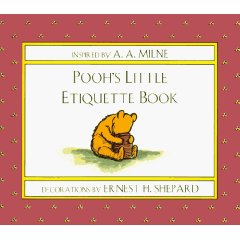 I grew up in a family in which manners extended well beyond “please” and “thank you,” and the placement of one’s napkin on one’s lap. I answered the phone “Graham residence, Ann speaking” and said “excuse me” before I interrupted adult conversation. I was also expected to recognize adult conversation, and to refrain from interjecting my own opinions or anecdotes unless they were requested. I was never encouraged to believe that I had the same rights as adults in the household, and consistently taught to consider “the other person” in matters which ranged from sitting through dull stories told by old people to expressing great joy upon receiving a(nother) knitted hat for Christmas.
I grew up in a family in which manners extended well beyond “please” and “thank you,” and the placement of one’s napkin on one’s lap. I answered the phone “Graham residence, Ann speaking” and said “excuse me” before I interrupted adult conversation. I was also expected to recognize adult conversation, and to refrain from interjecting my own opinions or anecdotes unless they were requested. I was never encouraged to believe that I had the same rights as adults in the household, and consistently taught to consider “the other person” in matters which ranged from sitting through dull stories told by old people to expressing great joy upon receiving a(nother) knitted hat for Christmas.
My brother and I were not allowed to chew gum, yell or play loud music in the house, or to thump up and down the stairs. We wrote thank-you notes, ate what we were served as guests and held doors for people. My mother disapproved of containers (milk, catsup, salsa, soda bottles) on the table, and required that condiments be decanted, and that we knew which forks and spoons were used for what purpose. We could sit through a concert or lecture without getting up or rattling wrappers, and we could eat at a nice restaurant without disturbing other diners. If we had to, we could sit still while the adults drank (endless) cups of coffee after dinner and discussed people we didn’t know. We were not allowed to use the words “fart” or “butt” or to comment in any way about the passing of gas.
 |
I grew up in a family in which manners extended well beyond “please” and “thank you,” and the placement of one’s napkin on one’s lap. I answered the phone “Graham residence, Ann speaking” and said “excuse me” before I interrupted adult conversation. I was also expected to recognize adult conversation, and to refrain from interjecting my own opinions or anecdotes unless they were requested. I was never encouraged to believe that I had the same rights as adults in the household, and consistently taught to consider “the other person” in matters which ranged from sitting through dull stories told by old people to expressing great joy upon receiving a(nother) knitted hat for Christmas.
My brother and I were not allowed to chew gum, yell or play loud music in the house, or to thump up and down the stairs. We wrote thank-you notes, ate what we were served as guests and held doors for people. My mother disapproved of containers (milk, catsup, salsa, soda bottles) on the table, and required that condiments be decanted, and that we knew which forks and spoons were used for what purpose. We could sit through a concert or lecture without getting up or rattling wrappers, and we could eat at a nice restaurant without disturbing other diners. If we had to, we could sit still while the adults drank (endless) cups of coffee after dinner and discussed people we didn’t know. We were not allowed to use the words “fart” or “butt” or to comment in any way about the passing of gas.
We were well-loved, thoroughly supported and doted upon; we were simply expected to behave well in most circumstances. The basic premise of our upbringing was that the opinions and activities of children are interesting mainly to those children and their immediate families, and that adults outside of that circle should not be discomfited in any way by their presence. Charmed and entertained, absolutely, but not disturbed or annoyed. Under the guise of “manners” we were being taught to be civil, compassionate members of society – to listen patiently, think of others and be grateful, gracious and helpful.
 In my present family, the rules of my childhood are largely dismissed as archaic, artificial and repressive. My husband was raised on a rural farm with five other children, and while his parents both have lovely manners, they were lucky to keep napkins on laps and elbows off the table without concerning themselves with the vulgarity of gum chewing or inquiries about who had “cut the cheese.” I believe we have taught my son to behave well in public and to consider the feelings of others, but his manners at home are sometimes appalling. He has the questionable gift of being able to adhere to all of my parents’ rules at their house, and then to slip back into ill-mannered sloth at home.
In my present family, the rules of my childhood are largely dismissed as archaic, artificial and repressive. My husband was raised on a rural farm with five other children, and while his parents both have lovely manners, they were lucky to keep napkins on laps and elbows off the table without concerning themselves with the vulgarity of gum chewing or inquiries about who had “cut the cheese.” I believe we have taught my son to behave well in public and to consider the feelings of others, but his manners at home are sometimes appalling. He has the questionable gift of being able to adhere to all of my parents’ rules at their house, and then to slip back into ill-mannered sloth at home.
While some of the rules have fallen away at my house for reasons of expedience (my life is too short to decant catsup) others are rejected on the basis that the rules were just plain weird to begin with. Gum was made to be chewed! Who wants bored kids sitting around fidgeting while adults try to talk? In addition, there is the ever-popular refrain “no one does that!” Apparently I am living in a door-slamming, gum-chewing universe where children are encouraged to recite the complete play-by-play of favorite Disney movies in the middle of adult conversations and announce every ingested bean and every resulting emission with great relish.
I have also been advised by both professional and lay analysts that the rules of my upbringing were a way of squelching my natural impulses and denying my true self, and that children must be free to express themselves, and simply “be.” If that means throwing a football in the house, or interrupting grandma’s monologue about her walking tour in Denmark, so be it.
 In the context of my house, I am suffering from battle fatigue. I am told so often that my inclinations are snobbish and outdated, that I tend to save myself for egregious behavior. My son chews gum, plays loud music, and thumps on the stairs with impunity. For now, I am trying to be satisfied with the fact that his manners in the Great World are decent (aside from a baffling inability to move a napkin from table to lap), and he is an essentially a kind human being. That should mean that the important lessons are being learned, and that we can work on refinements.
In the context of my house, I am suffering from battle fatigue. I am told so often that my inclinations are snobbish and outdated, that I tend to save myself for egregious behavior. My son chews gum, plays loud music, and thumps on the stairs with impunity. For now, I am trying to be satisfied with the fact that his manners in the Great World are decent (aside from a baffling inability to move a napkin from table to lap), and he is an essentially a kind human being. That should mean that the important lessons are being learned, and that we can work on refinements.
Secretly, though, I delight in accounts of well-mannered children carrying the torch of etiquette. I devour stories in the New York Times about children who are sent to special schools to learn how to behave at the dinner table, how to meet and speak with adults, and how to behave at the theater. I nearly wept tears of joy when I called an old friend and her daughter answered with the familiar “Smith residence, Alice speaking.” Call me repressive, old-fashioned, or simply “weird,” but I believe that manners are an embodiment of civilized society. I would hate to think that there is no longer any place for them in the world in which I live.
Ann Graham Nichols cooks and writes the Forest Street Kitchen blog in East Lansing, Michigan where she lives in a 1912 house with her husband, her son and an improbable number of animals.

